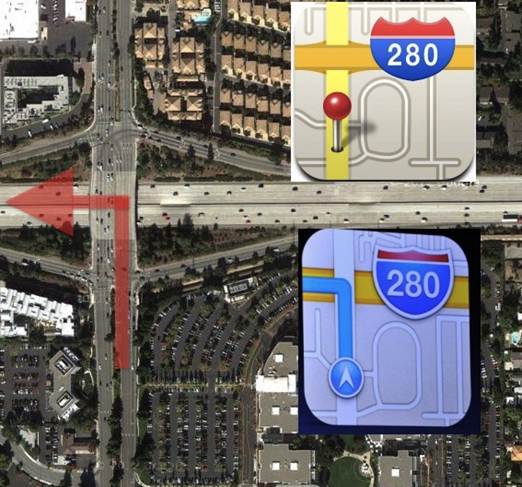Apple says sorry for iOS 6 Maps,
recommends rival products
APPLE HAS APOLOGISED to iOS 6 users for serious problems with the new Maps app that
replaces the Google-based version included since the first iPhone. In an open
letter on Apple’s website, CEO Tim Cook wrote: ‘We strive to make world-class
products that deliver the best experience possible to our customers. With the
launch of our new Maps last week, we fell short on this commitment.
‘We are extremely sorry for the frustration
this has caused our customers and we are doing everything we can to make Maps
better.’

‘We
strive to make world-class products that deliver the best experience possible
to our customers’
Cook explained that Apple ‘had to create a
new version of Maps from the ground up’ – using a completely new display engine
to present mapping data from other source because ‘we wanted to provide our
customers with even better Maps including features such as turn-by-turn
directions, voice integration, Flyover and vector-based maps.’
According to reports, it was Google’s
decision not to offer turn by turn directions in the iOS version of Maps a
feature available since 2010 in the product for Google’s own mobile OS, Android
that prompted Apple to develop its own system, with which it then ambushed
Google.
The New York Times, quoting unnamed
sources, said the search company would offer a standalone iOS app within
months, but remarks by Google executive chairman Eric Schmidt cast doubt on
this.
Welcoming feedback and promising to ‘keep
working non-stop’ until Maps reached Apple’s ‘incredibly high standard’, Cook
made the unusual move of suggesting iOS users ‘try downloading map apps from
the App Store like Bing, MapQuest and Waze, or use Google or Nokia maps by
going to their websites and creating an icon on [the] home screen’. Google Maps
has long been available as a web app in Safari for iOS, but without the Street
View feature that many users miss in Apple Maps. As we go to press, Google has
added this in a limited form.
MAPS WAS ONE
of the key new features preannounced for iOS 6, but testers were wary of
commenting on its performance until the final version appeared although unlike
Siri, Apple’s previous feature innovation, Maps wasn’t labelled as ‘beta’ at
launch. Users began to report problems as soon as iOS 6 was publicly released
on 19 September.

TURN-BY-TURN
DIRECTIONS, similar to an in-car satnav
Some of the most glaring errors are in the
ambitious new 3D views, including mangled bridges, bizarrely distorted
landscapes and an invisible Statue of Liberty, manifested only as a shadow.
There are also widespread problems with labelling (the Washington Monument is
incorrectly marked), search (in the UK, entering ‘Luton’ shows only the small
town of that name in Devon, not the much larger Luton in Bedfordshire) and
localisation (a MacUser reader in Bangkok found all the streets suddenly
labelled only in Thai script, despite a Settings option to show mapping in
English).
Irish justice minister Alan Shatter voiced
concern that the 35-acre estate of Airfield in his constituency had been
designated as an airport. ‘Clearly this is not only wrong but dangerously
misleading,’ said Shatter. ‘I have requested that it be urgently corrected.’
In many places the satellite images used
fall far below the quality and resolution users have come to expect from
Google, with Stafford and Brighton, for example, so badly blurred it’s
difficult to make anything out at all. Poor stitching of imagery from different
sources means landscapes can change sharply from day to night or summer to
winter, with some features omitted or appearing twice.
TURN-BY-TURN DIRECTIONS, similar to an in-car satnav, will be welcomed as a built-in
feature, since third party apps offering it have been among the most expensive
on the App Store. In the UK, one of the territories where data has been
provided to Apple by satnav maker TomTom, turn-by-turn seems to be working
well. Elsewhere, however, users have reported that it failed to find a direct
route or misdirected them completely.
The errors prompted Noah Bardin, CEO of
Waze, which is also listed as a mapping partner by Apple, to offer candid
criticism to Business Insider. ‘Apple went out and partnered with the weakest
player,’ said Bardin, referring to TomTom. ‘They’re now coming out with the
lowest, weakest data set and they’re competing against Google, which has the
highest data set. What’s going to happen with the Apple maps is that you’re
literally not going to find things. When you do find them, they might be in the
wrong position geographically. And if you do have it, the route to it may not
be the optimal route.’
Bardin later softened his remarks, saying
Apple Maps was not ‘terrible’.
Former Apple marketing chief Jean-Louis
Gassée pointed out on his Monday Note blog that the ridicule poured on Maps was
Apple’s own fault for raising expectations during the iOS 6 launch event. ‘The
demo was flawless… not a word from the stage about the app’s limitations, no
self-deprecating wink, no admission that iOS Maps is an infant that needs to
learn to crawl before walking, running, and ultimately lapping the frontrunner,
Google Maps. Instead, we’re told [it’s] “the most beautiful, powerful mapping
service ever”.’ Apple has since deleted this claim from its marketing of iOS 6.
That demo, like Siri’s in 2011, was given
by Scott Forstall, head of iOS software, and commentators such as veteran tech
writer Philip Elmer-DeWitt were quick to allocate blame for both products
failing to live up to the hype. ‘Does Apple have a Scott Forstall problem?’
asked DeWitt on Fortune.com.
‘We think it would have been better if they
had kept our [app]. But what do I know?’ was the disingenuous comment of
Google’s Eric Schmidt, whose conflict of interest as an Apple board member and
the search giant’s then CEO originally sparked the bitter rivalry between the
two companies.
Tim Cook must be tempted to agree.